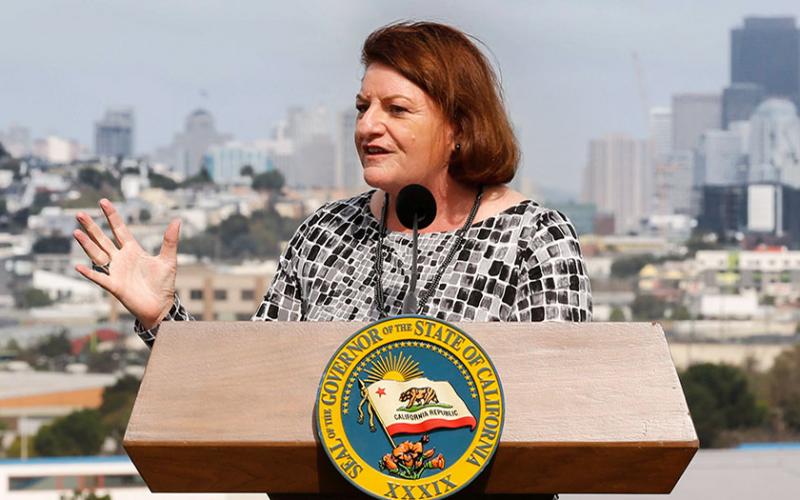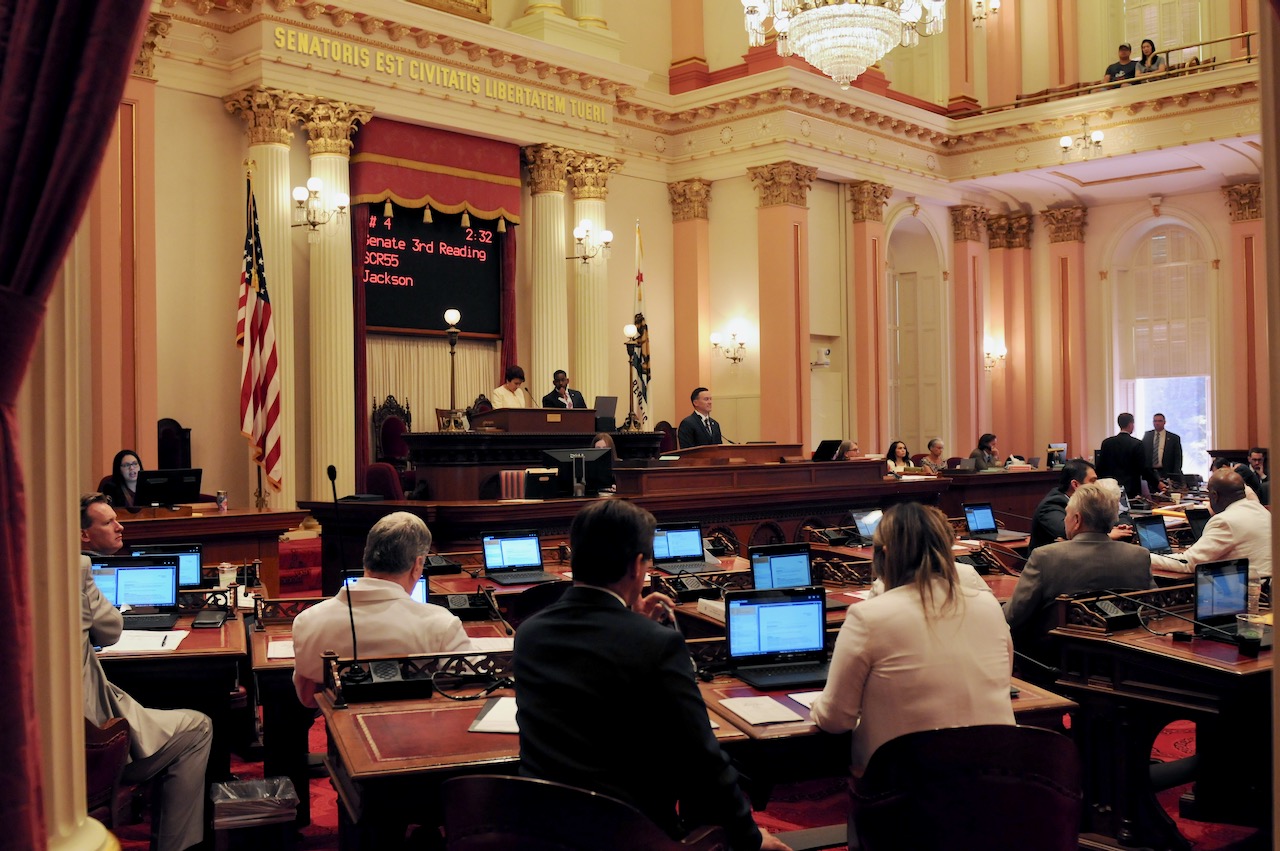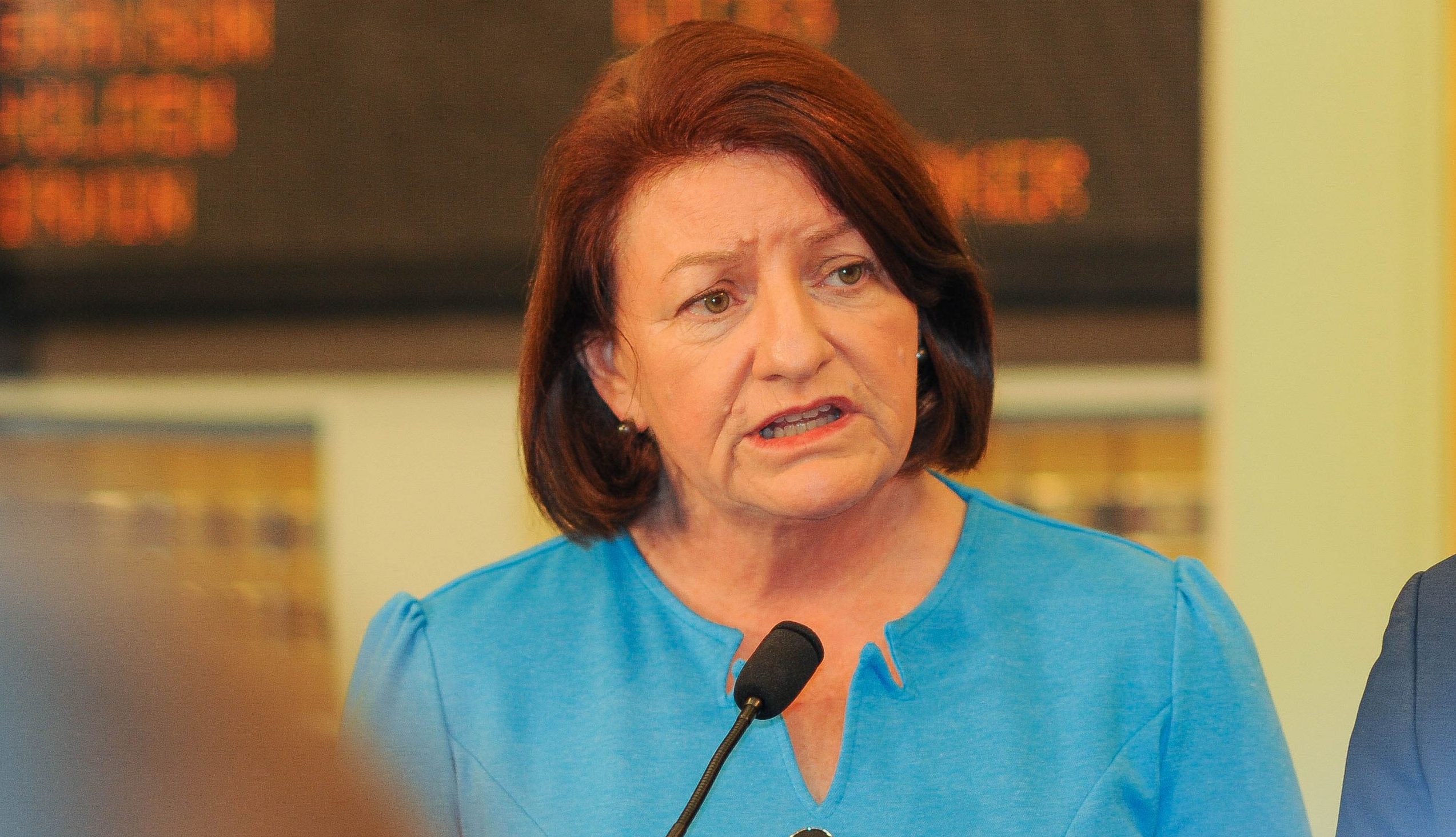
California State Senate President Pro Tempore Toni Atkins. (Photo: sd39.senate.ca.gov)
California Senate Adopts New Rules
Legislative ethics, emergency procedures, speaking and voting rule changes
By Chris Micheli, January 11, 2021 5:12 pm
Last month, on the first day of the Legislative Session, the State Assembly adopted its Rules for the 2021-22 Regular Session. On January 11, when the Legislature reconvened, the State Senate adopted SR 3 (Atkins) relative to the Standing Rules of the Senate for the 2021-22 Regular Session. Like the Assembly, the State Senate made a number of modifications to the Senate Rules, including the following (new additions are in bold italics, and repealed provisions are in strike-thru):
SR 11 – Appointment of Committees
11.The Committee on Rules shall consist of the President pro Tempore of the Senate, who shall be the chair of the committee, and four other Members of the Senate to be elected by the Senate. There is a vacancy on the committee in the event a member ceases to be a Member of the Senate or resigns from the Committee on Rules. Any vacancy occurring during a summer, interim study, or final recess, except in the case of the President pro Tempore, shall be filled by the remaining members of the Committee on Rules President pro Tempore. A vacancy occurring at any other time shall be filled by election by the Senate.
The Committee on Rules President pro Tempore shall appoint all other committees of the Senate and shall designate a chair and vice chair of each committee.
In making committee appointments, the Committee on Rules President pro Tempore shall give consideration to seniority, preference, and experience. However, in making committee appointments, the Committee on Rules President pro Tempore shall, as far as practicable, give equal representation to all parts of the state.
SR 12.3 – Committee on Legislative Ethics
12.3. (a) (1) The Committee on Legislative Ethics is hereby created. The committee shall consist of six Senators, at least two of whom are members of the political party having the greatest number of members in the Senate and at least two of whom are members of the political party having the second greatest number of members in the Senate. The members of the committee shall serve two-year terms. The President pro Tempore and the Minority Floor Leader shall serve as ex officio, nonvoting members of the committee. No more than one member of the Committee on Rules from each of those political parties shall be appointed to the committee as voting members.
(2) The Chair and Vice Chair may not be members of the same political party. The Chair may not serve more than two consecutive two-year terms and the Committee on Rules shall select a successor who is not a member of the same political party as the immediately previous Chair.
SR 13 – Committee on Rules
13. (a) The Committee on Rules is charged with the general responsibility for the administrative functioning of the Senate. The committee has general charge of the books, documents, and other papers and property of the Senate and shall see that the same are properly kept, cared for, filed, or otherwise disposed of in accordance with applicable law and rules. The committee also has the duties of making studies and recommendations designed to promote, improve, and expedite the business and procedure of the Senate and its committees, including investigating committees consisting wholly or in part of Members of the Senate, and of proposing any amendments to the rules deemed necessary to accomplish those purposes.
(b) The Committee on Rules shall continue in existence during any recess of the Legislature until the convening of the next regular session, and shall have the same powers and duties as while the Senate is in session. The committee has the authority to fill vacancies in any Senate committee or in the Senate membership of any joint committee.
SR 13.8 Rules Committee Appointees
13.8. The Committee on Rules shall review its nonlegislator appointees every two years. That review shall be completed not later than the 120th calendar day of the regular session in which the review is undertaken.
SR 22.7 – Bills Assigning, Requesting, or Requiring Studies
22.7. Except as determined by the Committee on Rules, a bill that assigns, requests, or requires a study, or is amended to assign, request, or require a study, shall be rereferred to the Committee on Rules.
SR 35 – Regulations as to Speaking
35.(a) When a Senator desires to address the Senate, the Senator shall rise at the Senator’s desk, address the Presiding Officer, and, when recognized, proceed to speak through the public address system. When speaking, the Senator shall confine the Senator’s remarks to the question before the house. A Senator who has not been recognized by the Presiding Officer shall not address the body.
(b) A Senator may not speak more than twice in any one debate on the same day, and at the same stage of the bill, without leave; Senators who have once spoken are not again entitled to the floor (except for explanation) so long as any Senator who has not spoken desires to speak. During the five days prior to the deadline for each house to pass bills introduced in that house and the five days prior to the last day for each house to pass bills, limits may be adopted to expedite the completion of the Senate’s business by limiting the number of speakers per measure, amendment, or debatable motion and the time allotted to each speaker as long as these limits are applied equally to speakers in support and in opposition.
(c) When two or more Senators arise at the same time to address the Senate, the Presiding Officer shall designate the Senator who is entitled to the floor.
(d) A Senator may not be interrupted when speaking, and no question may be asked of the Senator except through the Presiding Officer.
(e) The author or floor manager of a bill, motion, or resolution shall have the privilege of closing the debate, and may elect to answer questions raised in the debate during the author’s or floor manager’s closing.
SR 47 – Vote Required
47.Unless otherwise required by the Constitution, the Joint Rules of the Senate and Assembly, or these rules, any action that can be taken by the Senate requires only a majority vote of the Senate, a quorum being present.
The following actions require 35 votes:
(1) To pass a bill amending specified provisions of the Protect App-Based Drivers and Services Act (Prop. 22, Nov. 3, 2020; Sec. 7465, Bus. & Prof. C.).
…
The following actions require 28 votes:
(11) To pass a bill amending the statutory provisions, other than the bond provisions, of the California Stem Cell Research and Cures Act (Sec. 8, Prop. 71, Nov. 2, 2004).
(12) To pass a bill amending the statutory provisions of the Victims’ Bill of Rights Act (Sec. 9, Prop. 9, Nov. 4, 2008).
(13) To pass a bill amending the statutory provisions, other than the bond provisions, of the California Stem Cell Research, Treatments, and Cures Initiative of 2020 (Sec. 26, Prop. 14, Nov. 3, 2020).
…
SR 56 – Procedures During Emergencies
56.(a) This rule applies only during an emergency. For purposes of this rule, “emergency” means a state of emergency or a local emergency, as those terms are defined in Section 8558 of the Government Code, or an imminent threat of a state of emergency or local emergency.
(b) The President pro Tempore or the President pro Tempore’s designee may assign, remove, and replace any member of a standing, joint, or special committee or subcommittee during an emergency. The President pro Tempore may also establish, define the jurisdiction of, and appoint members and staff to any special committee that the President pro Tempore deems necessary.
(c) (1) During an emergency, the President pro Tempore or the President pro Tempore’s designee may authorize a standing, joint, or special committee or subcommittee to conduct a meeting in which one or more members of the committee participate remotely by telephone, teleconference, videoconference, or other electronic means. The public may also participate remotely in the meeting by any means made available by the committee.
(2) During an emergency, the President pro Tempore may determine that Senators who are participating remotely can be considered present for purposes of determining if a quorum is present.
(3) With a quorum present, a vote of a majority of the members of a committee shall be required to report a bill, constitutional amendment, or resolution out of the committee.
(d) (1) During an emergency, the President pro Tempore or the President pro Tempore’s designee may authorize a meeting of the Senate to be conducted at which one or more Senators participate in the meeting remotely by telephone, teleconference, videoconference or other electronic means.
(2) During an emergency, the President pro Tempore may determine that Senators who are participating remotely can be considered present for purposes of determining if a quorum is present.
(3) When a Senator participating remotely desires to address the Senate, the Senator shall notify the Presiding Officer through the electronic means used by the Senator to participate remotely. When recognized, the Presiding Officer shall announce the Senator and the Senator may speak through the same electronic means.
(e) To the extent practicable, a Senator who requests to participate or vote remotely must submit a request to the Secretary of the Senate and obtain approval from the Secretary prior to participating or voting remotely.
(f) To the extent practicable, a Senator participating remotely under this rule shall participate from the Senator’s district office with the office background visible without video alteration.
(g) A Senator participating remotely by electronic means who has been authorized to vote remotely may vote during a rollcall vote. The Senator must be visible and audible through the electronic means used for remote participation at the time the Senator casts a vote. The Secretary of the Senate shall prepare a certification of votes cast remotely which shall be signed by the Senator voting remotely to certify the Senator’s vote.
(h) During an emergency, no Senator other than the author or floor manager may be allowed to speak more than three minutes on any measure, amendment, or debatable motion. The author or floor manager may speak for a total of five minutes, which shall include the author’s or floor manager’s opening and closing statements. Questions asked of the author or floor manager by any Senator shall be charged to that Senator’s allotted time.
(i) During an emergency, the Committee on Rules may adopt limits on the number of bills each Senator and Member of the Assembly may have heard by the Senate during the emergency.
(j) During an emergency, the President pro Tempore may adopt additional policies and protocols to protect the health and safety of Senators, staff, and the public.
- Statewide Child Support Registry - January 2, 2026
- Foreign Country Money Judgments - January 2, 2026
- How Many Bills Are on the Inactive Files? - January 1, 2026




No wonder nothing gets done of any substance in Sacramento…
Who else’s brain hurts, trying to power through this drivel???
Oh no fellow Comrades….he who makes the rules…..rules…..get comfortable with it….